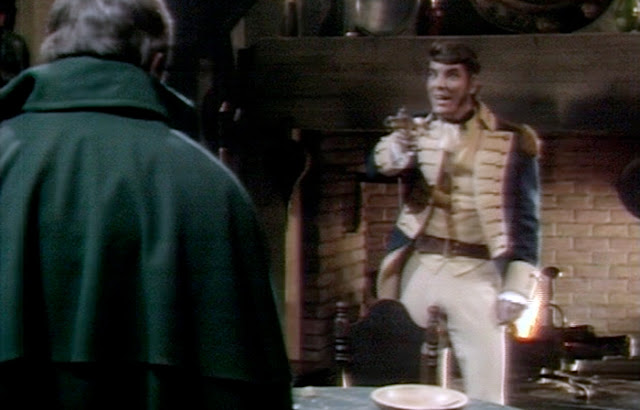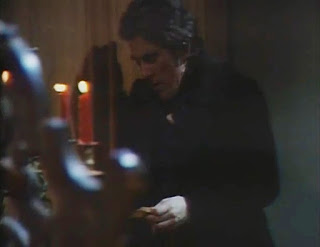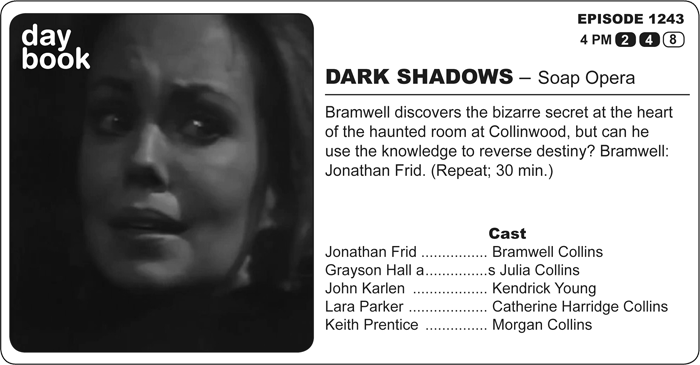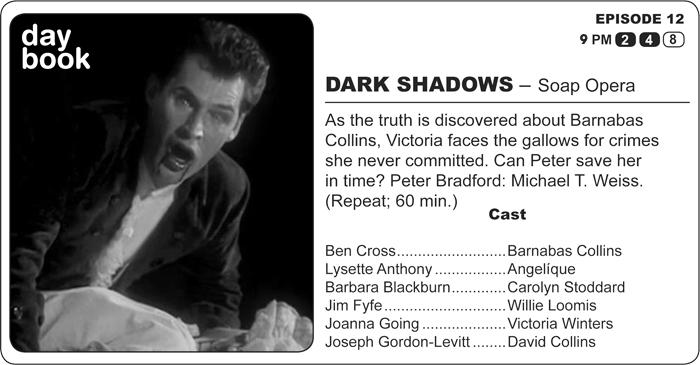Taped on this date in 1968: Episode 459
By PATRICK McCRAY
In the wake of his mothers suicide, Barnabas Collins vows to take revenge… if his father doesn’t shoot him with a silver bullet, first. Joshua: Louis Edmonds. (Repeat; 30 minutes)
Hearing that his mother is dead because of revelations by Nathan Forbes, Barnabas goes about the business of revenge. Meanwhile, Forbes responds with a crossbow.
In 1795, the cherished friends and beloved relatives around Barnabas Collins have been dead for years. Barnabas was, too. Until, and you see this coming, he died. This would all be “electrocuting a dead horse” except that this arc mentions the concepts of death and life constantly. When Jonathan Frid delivers the line telling Forbes that bullets will have no effect because he’s already dead, he’s savors the words with unusually deliberate relish. In fact, he is at his most Shakespearean in this episode. Not because of an accent. Not because he stands around posing in tights, using archaic language. No, for legitimate reasons. Listen to his treatment of the really grand statements. Words are stretched into multisyllabic wrappings over decisions and discoveries of cosmic import. He’s not only getting the most out of their intentional weight. He has found the dreadful music of death and revenge and the language that describes them.
We take death for granted on Dark Shadows. In 1795, it’s not just a consequence. It is the subject of philosophical heft without weighing the audience down with ascetic and academic self-consciousness about it. Death is both a metaphor and a very real state of being. For once, it has, by explored implication, been given proper attention… and by implication so has a meaningful life. We stand on the battlefield of fallen characters who have no voice. Well, except for one.
By finally standing outside of Life, there are no more appearances to keep up. Really, all of the rules of the living are what cost Barnabas his life. Was he in love with Josette? Perhaps social class taboos and a marriage prospect with a business prospect chaser kept him from confessing his true feelings, even to himself. I don’t call that living.
The fact that Barnabas walks and speaks and feels is all of the proof we need that, on this program, death simply releases a cursed figure to explore living. Joshua, on the other hand, is a prisoner to expectations. His need to appear in control is so pervasive and toxic that it takes being in the throes of death for his wife to say she still loves him.
Of course, the real journey of the storyline belongs to Joshua, reluctantly exploring and admitting the moments of humanity forbidden to him otherwise. It’s unclear how Joshua became so incredibly stoic, but I will guess that life at sea, having to coexist among pirates and slavers, changes a man. His charting of an underdeveloped sense of humanity exists less on the page, and so Louis Edmonds must be lavishly praised for his efforts to do so. In theory, it’s a broad part. Shouting. Taking umbrage. Being at a loss for words on a nearly hourly basis. You know, those things are easy. They are a puckish southerner’s spoof of New England finery. Underneath that is a keenly focused, gently urged character evolution. Frankly, if the actions of Angelique could not bring that about, the character would lack humanity, completely.More than anywhere else, we see the effects of the curse. Exactly what she said: those he loved would die. But why make him a vampire at the same time? Of course, so that he could be the cause. The triple somersault of irony being that, outside of the domain of the living, subsisting by the ethics and standards of the dead, Barnabas would eventually live to a point that he realized he loved Angelique. And that’s the one part of the curse that, in 1840, she forgot to lift. This isn’t a soap opera. It’s Shakespeare writing a Greek tragedy commissioned by Rod Serling.
On a technical level, it’s not a soap opera either. An episode like this is the payoff that we somehow knew was possible while making our way through often hundreds of episodes of semi-repeated exposition with a sidecar of looming implication. Every time Dark Shadows has an episode like that, it carries with it an implicit promise for something more. This episode is as tight and propulsive as anything written for prime time. Frid, Edmonds, Joel Crothers, and Thayer David glide through the action with equal parts passion and confidence. There has never been better chemistry on the program than with Jonathan Frid and Louis Edmonds as Barnabas and Joshua. Opening with the immediate fallout from Naomi‘s suicide, and with the ticking clocks of Victoria's fate and the oncoming sunrise, it manages to go about solving its problems (and inventing new ones) with purposeful urgency that never devolves into sloppiness or panic. It’s too busy addressing the problems of the living with the insight of the dead.






